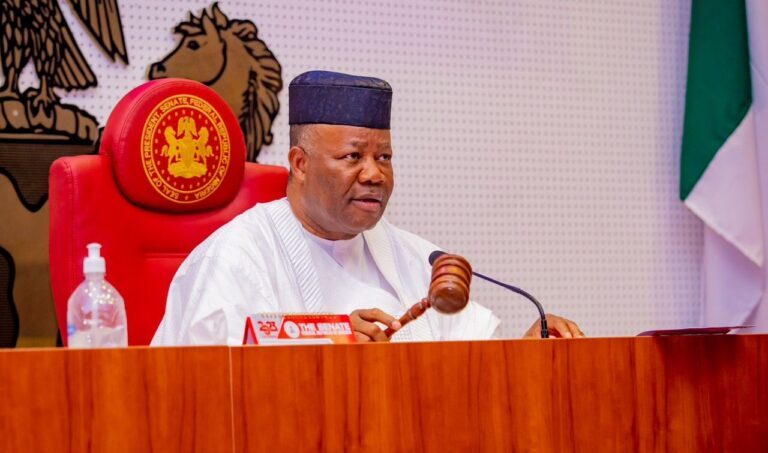He said that compliance with legislative resolutions were not optional but binding on MDAs and other public institutions.
Akpabio stated this on Tuesday in Abuja at the 2nd National Workshop organised by the Senate Committee on Legislative Compliance.
The News Agency of Nigeria (NAN) reports that the workshop had as it’s theme “Consolidating Strategies for Strengthening Legislative Compliance by MDAs.”
Akpabio, who was represented by Sen. Osita Ngwu, the Minority Whip of the Senate, said compliance was a constitutional obligation owed by all arms and levels of government to the people of Nigeria.
” let me state emphatically, compliance with legislative resolutions is not optional. It is absolutely fundamental.
“Our laws, policies, and oversight functions are meant to guide the execution of government programmes in a manner that ensures transparency, equity, and effectiveness.
“When departments and agencies fail to comply with legislative directives, they undermine not just the authority of the legislature but the collective will of the Nigerian people, whom we all represent,” he said.
The president of the Senate stressed the need for public institutions to work closely with the National Assembly to develop an egalitarian society.
“When public institutions ignore legislative resolutions, when compliance becomes selective, and when oversight is treated with disdain, the result is a breakdown in trust.
“As the President of the Senate, I give you full assurance that the National Assembly remains unwavering in its resolve to ensure that its resolutions are not only respected but also implemented.
“The days of impunity must give way to the reign of institutional discipline. However, enforcement must be accompanied by engagement,” he said.
Chairman of the Senate Committee on Legislative Compliance, Sen. Ede Dafinone, in his remarks decried the non-compliance of some MDAS to National Assembly resolutions.
“In recent times, we have witnessed several instances where MDAs and public institutions have either delayed or outrightly disregarded legislative resolutions passed by the Senate.
“These actions not only undermine the authority of the legislature but also weaken the very foundation of our democratic institutions,” he said.
He said the workshop was aimed at providing a platform for stakeholders to critically examine the root causes of non-compliance.
According to him, they include legal ambiguity, institutional rivalry, capacity gaps, and bureaucratic challenges.
He noted that the goal was to develop practical and enforceable solutions.
Dafinone urged MDAs to collectively work towards bridging the gap between legislation and execution for good governance, institutional effectiveness, and the benefit of the Nigerian people.
Mr Francis Usani, Director of Fraud Risk Assessment, Prevention and Control, who represented the Chairman of the EFCC, Mr Ola Olukoyede, commended the initiators of the workshop.
“This workshop couldn’t have come at a better time—when we are witnessing increased instances of laws, policies, rules, and regulations being observed more in the breach than in compliance,” he said
He emphasised that the legislature, by constitutional provision, is saddled with the responsibility of making laws for good governance and democracy.
He added that democracy can only be sustained where laws are made and obeyed.
“Compliance with resolutions made by the legislature is therefore critical to the sustenance of institutions. It is widely said that where there are no laws, there will be anarchy.
“And where laws are made but not complied with or implemented, there will also be anarchy,” he said. (NAN)










